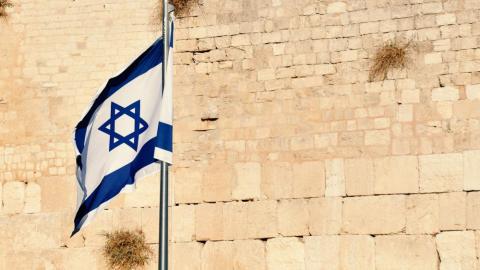This is a modal window.
The Playback API request failed for an unknown reason
How Close Is Saudi Recognition of Israel? Netanyahu Can 'Taste' It
In a major development for the Middle East, Israel and Saudi Arabia are taking steps toward possibly normalizing relations.
Israeli officials were set to hold meetings this week at the White House after the U.S. and Saudi Arabia reportedly agreed to a broad outline for a deal in which Saudi Arabia would recognize Israel.
But the Saudis are asking a lot; not only for Israeli help in the creation of an independent Palestinian state, but U.S. security guarantees and help creating a civilian nuclear program.
White House National Security Council Spokesman John Kirby said a deal is not close at hand.
"Quite frankly, just to be blunt here, I think the reporting has left some people with the impression that the discussions are farther along and closer to some sense of certainty than they actually are," Kirby said. "There's still a lot of discussing to happen here. There's still a lot of conversations that have to occur before we get there."
But former Israeli Ambassador to the UN Danny Danon said he believes Saudi Arabia is likely to join the Abraham Accords and normalize ties with Israel within the next year.
Still, former U.S. Ambassador to Israel Martin Indyk compared the complexity of the deal to a Rubik's cube, telling the Israel Policy Forum, "I say that because this is a three-way deal, which is what it would be, between Israel, the United States and Saudi Arabia, and if it comes about, is kind of like a Rubik's Cube. There are so many moving pieces that have to be put into place in an intricate diplomatic dance."
Dr. Ariel Cohen of the Atlantic Council's Eurasia Center told CNBC International that all the demands made by the Saudis will make a deal difficult.
"The Saudis, the Prince Mohammed bin Salman, asked for a very high price for normalization with Israel," Cohen said. "He wanted nuclear technology with very few strings attached to be provided to Saudi Arabia, enrichment of uranium, he wanted an ironclad guarantee that if Saudi Arabia is attacked by Iran, the United States will step in and go to war for the kingdom."
Israeli opposition leader Yair Lapid has told U.S. lawmakers he opposes any normalization agreement that enables Saudi Arabia to enrich uranium on its own soil, warning it could lead to a new arms race in the Middle East.
But Indyk says a deal is a high priority for all three governments, the U.S., Saudi Arabia, and Israel.
"There is a sense of urgency, Indyk said. "And what's important about this is not only that the sense of urgency appears to be matched by the Crown Prince of Saudi Arabia, but of course it's matched by Prime Minister Netanyahu, which for him it's one of his most important foreign policy priorities. Now he can taste the possibility of peace between Israel and Saudi Arabia, and he wants to go for it. And there is a commitment from the highest level of the U.S. government to try to produce an Israeli-Saudi peace deal for normalization within the next six months, by the end of this year."
The White House says it wants to somehow complete the deal before the presidential election campaign heats up. Some think that's too soon and a deal will have to wait until after the 2024 election.



